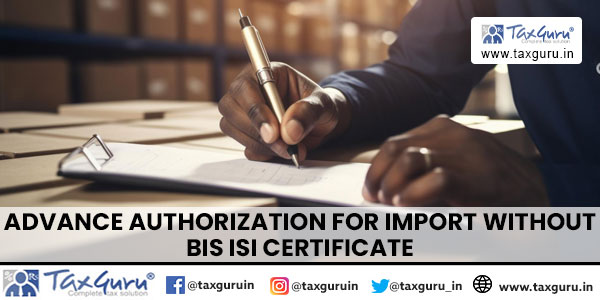Can Import of Goods Covered Under Mandatory QCO as Raw Material for Manufacture of Export Goods Be Done Without BIS Certification?
In the realm of manufacturing and trade, understanding the legal requirements for importing goods, especially those intended for the manufacture of export products, is crucial. The Bureau of Indian Standards (BIS) plays a significant role in ensuring the quality and safety of goods sold within India. This brings us to the intricate issue of whether goods covered under mandatory Quality Control Orders (QCO) can be imported without a BIS certificate as raw material by manufacturers intending to use these goods for export purposes.
Understanding the Legal Framework
As per the legal framework, specifically section 17 (1), it is stated that no person shall manufacture, import, distribute, sell, hire, lease, store, or exhibit for sale any goods, articles, processes, systems, or services notified under the BIS mandatory certification scheme without a Standard Mark, except under a valid license. Furthermore, even with a license, applying a Standard Mark is prohibited unless the goods or services conform to the relevant standards or prescribed essential requirements.
This stipulation clearly indicates that importing without complying with Indian Standards (IS) is not permissible.
The primary aim of BIS regulation is to regulate the quality of goods within the Indian market. However, the question arises about the fate of notified products imported as raw materials for use in domestically manufactured goods that are exported outside India. While some QCOs provide clear exemptions for such goods, ambiguity remains in various other QCOs regarding this aspect like Copper products, Steel related products etc.
The Industry’s Struggle for Clarity
The industry has been facing challenges in finding clear answers to this query. Manufacturers often encounter apprehensions at customs ports, where they face queries from customs officers, and their clearances are not smooth. They struggle to clarify that the application of domestic laws regarding quality standards is meant for goods sold in Indian markets. Despite various notifications and circulars issued by the Directorate General of Foreign Trade (DGFT) addressing this issue, the lack of a one-to-one correlation and a mechanism for the actual user to assume liability during customs clearance persists.
The Solution: Advance Authorization
The most effective mechanism to safeguard against such complications is to apply for Advance Authorization as per the Foreign Trade Policy (FTP), following the prescribed process. However, it is very important to note that importing without adhering to the process specifically prescribed for such imports can lead to the denial of exemption from the application of mandatory QCO, even for Advance Authorization holders.

Legal Expertise is Key
Given the complexities involved, it is advisable for manufacturers to seek detailed guidance from legal experts before proceeding with such imports or applying for advance authorizations. Understanding the procedure in depth and ensuring compliance with all regulatory requirements is essential to avoid potential legal hurdles and to facilitate smooth customs clearance.
In conclusion, while the framework aims to uphold the quality of goods within the Indian market, manufacturers seeking to import goods for export production must understand these regulations carefully. Advance Authorization emerges as a viable solution, yet adherence to the prescribed process and consultation with legal experts are paramount to ensure compliance and smooth operation in the global marketplace.
*****
The Author Ms. Anshul Mittal is working Partner at RSA Legal Solutions and can be contacted at info@rsalegalsolutions.com keywords for better reach: BIS certification, export goods, compliance, Indian Mandatory QCO, imports, exemptions, Advance Authorization, customs clearance; non-BIS goods, custom clearance; importing, legal advice, regulations; DGFT, BIS exemption; export manufacturing, QCOs; IS compliance, customs; global market, strategies; legal framework, BIS, QCO exemptions.





